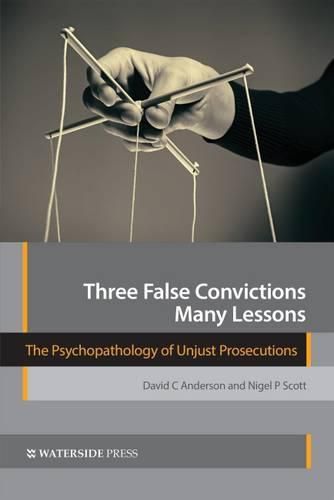Readings Newsletter
Become a Readings Member to make your shopping experience even easier.
Sign in or sign up for free!
You’re not far away from qualifying for FREE standard shipping within Australia
You’ve qualified for FREE standard shipping within Australia
The cart is loading…






This title is printed to order. This book may have been self-published. If so, we cannot guarantee the quality of the content. In the main most books will have gone through the editing process however some may not. We therefore suggest that you be aware of this before ordering this book. If in doubt check either the author or publisher’s details as we are unable to accept any returns unless they are faulty. Please contact us if you have any questions.
A new perspective on why false charges occur, proceed and persist which looks at the roles of psychopathology, confirmation bias, false confessions, the media and internet among other causes. Puts lack of empathy at the fore in terms of police, prosecutors and others whilst considering a wide range of other psychopathological aspects of false convictions. Based on first-hand knowledge or involvement (David Anderson was Stefan Kiszko’s endocrinologist and attended both his and the Knox/Sollecito trial). What drives false but serious criminal charges and why do police and prosecutors often persist against those wrongly in the dock? As this book shows-by looking at three high profile cases, those of Amanda Knox and Raffaele Sollecito (Italy), Stefan Kiszko (UK) and Darlie Routier (USA)-motive forces are a mind-set in which psychopathy (what the authors charitably term ‘constitutional negative empathy’) may be present and in which confirmation bias (the need to reinforce a decision once made or lose face) plays a large part.Darlie Routier is still on death row in Texas despite overwhelming evidence that her conviction for killing her own child is false, whilst Knox, Sollecito and Kiszko have been vindicated by the highest and best of authority and compelling evidence. The authors show how wholly unfounded rumours still persist in the Knox/Sollecito case due to hostile media and internet trolling. In the Routier case they advance a new theory that the killings (two in all) were in fact the work of a notorious serial killer.‘In the light of all this, questionable trial procedures need to be overhauled, with much greater recognition of (their) imperfections and of the general imbalance in favour of the prosecution. Greater weight needs to be given…to establishing real, rather than merely judicial, truth’ - (Chapter 11).
$9.00 standard shipping within Australia
FREE standard shipping within Australia for orders over $100.00
Express & International shipping calculated at checkout
This title is printed to order. This book may have been self-published. If so, we cannot guarantee the quality of the content. In the main most books will have gone through the editing process however some may not. We therefore suggest that you be aware of this before ordering this book. If in doubt check either the author or publisher’s details as we are unable to accept any returns unless they are faulty. Please contact us if you have any questions.
A new perspective on why false charges occur, proceed and persist which looks at the roles of psychopathology, confirmation bias, false confessions, the media and internet among other causes. Puts lack of empathy at the fore in terms of police, prosecutors and others whilst considering a wide range of other psychopathological aspects of false convictions. Based on first-hand knowledge or involvement (David Anderson was Stefan Kiszko’s endocrinologist and attended both his and the Knox/Sollecito trial). What drives false but serious criminal charges and why do police and prosecutors often persist against those wrongly in the dock? As this book shows-by looking at three high profile cases, those of Amanda Knox and Raffaele Sollecito (Italy), Stefan Kiszko (UK) and Darlie Routier (USA)-motive forces are a mind-set in which psychopathy (what the authors charitably term ‘constitutional negative empathy’) may be present and in which confirmation bias (the need to reinforce a decision once made or lose face) plays a large part.Darlie Routier is still on death row in Texas despite overwhelming evidence that her conviction for killing her own child is false, whilst Knox, Sollecito and Kiszko have been vindicated by the highest and best of authority and compelling evidence. The authors show how wholly unfounded rumours still persist in the Knox/Sollecito case due to hostile media and internet trolling. In the Routier case they advance a new theory that the killings (two in all) were in fact the work of a notorious serial killer.‘In the light of all this, questionable trial procedures need to be overhauled, with much greater recognition of (their) imperfections and of the general imbalance in favour of the prosecution. Greater weight needs to be given…to establishing real, rather than merely judicial, truth’ - (Chapter 11).